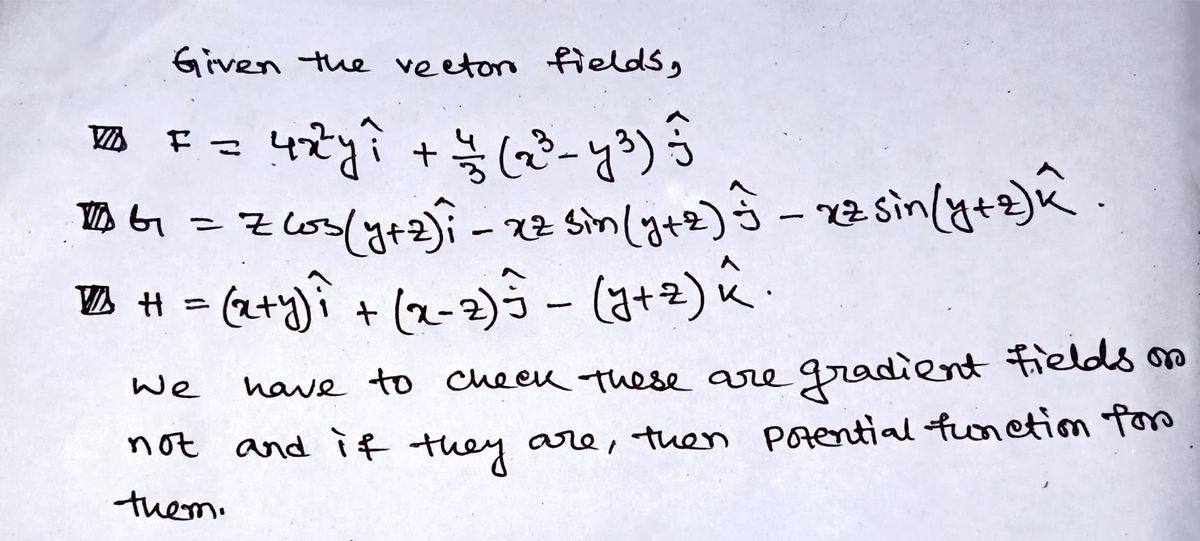3. Determine whether these vector fields are gradient fields, and if they are, find a potential function for them. (a) F = 4x²yi+ ¼(x³ – y³) j. (b) G = z cos(y+z) i − xz sin(y +z)j − xz sin(y + 2) k. (c) H = (x+y)i + (x − z)j − (y + 2) k.
3. Determine whether these vector fields are gradient fields, and if they are, find a potential function for them. (a) F = 4x²yi+ ¼(x³ – y³) j. (b) G = z cos(y+z) i − xz sin(y +z)j − xz sin(y + 2) k. (c) H = (x+y)i + (x − z)j − (y + 2) k.
Advanced Engineering Mathematics
10th Edition
ISBN:9780470458365
Author:Erwin Kreyszig
Publisher:Erwin Kreyszig
Chapter2: Second-order Linear Odes
Section: Chapter Questions
Problem 1RQ
Related questions
Question
#3

Transcribed Image Text:3. Determine whether these vector fields are gradient fields, and if they are, find a potential
function for them.
(a) F = 4x²yi + (x³ — y³) j.
(b) G = z cos(y+z) i − xz sin(y+z) j — xz sin(y+z) k.
-
(c) H = (x + y)i + (x − z) j − (y +z) k.
Expert Solution
Step 1: In this step,we write the given vector fields.

Step by step
Solved in 5 steps with 5 images

Recommended textbooks for you

Advanced Engineering Mathematics
Advanced Math
ISBN:
9780470458365
Author:
Erwin Kreyszig
Publisher:
Wiley, John & Sons, Incorporated

Numerical Methods for Engineers
Advanced Math
ISBN:
9780073397924
Author:
Steven C. Chapra Dr., Raymond P. Canale
Publisher:
McGraw-Hill Education

Introductory Mathematics for Engineering Applicat…
Advanced Math
ISBN:
9781118141809
Author:
Nathan Klingbeil
Publisher:
WILEY

Advanced Engineering Mathematics
Advanced Math
ISBN:
9780470458365
Author:
Erwin Kreyszig
Publisher:
Wiley, John & Sons, Incorporated

Numerical Methods for Engineers
Advanced Math
ISBN:
9780073397924
Author:
Steven C. Chapra Dr., Raymond P. Canale
Publisher:
McGraw-Hill Education

Introductory Mathematics for Engineering Applicat…
Advanced Math
ISBN:
9781118141809
Author:
Nathan Klingbeil
Publisher:
WILEY

Mathematics For Machine Technology
Advanced Math
ISBN:
9781337798310
Author:
Peterson, John.
Publisher:
Cengage Learning,

